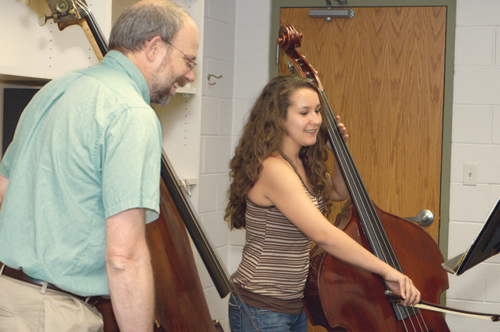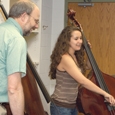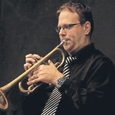
Steven hunched into my teaching studio and stood awkwardly inside the door, looking uncertain whether to sit down or bolt. I was even more nervous than he was; I had never taught a student with autism, and was scared to disappoint both the band director and Steven’s parents, from whom I’d received several emails each.
In those early lessons Steven would throw a fit when he got frustrated. His plea was always, “I can’t do it. Let’s just stop.” It wasn’t long before I discovered his amazing ear; he could hear something once and play it back to me almost note-perfectly, but even a minor critique could just devastate him.
I restrained my usually boisterous personality with Steven. My focus on being gentle and steady for him, teaching him strategies to remain calm and focused when he got stuck. I knew the tide had turned when one lesson, during his second year of study, he turned to me during a rough passage and said, “I know I can do this. I just need a minute to figure it out.”
After five years of study, Steven auditioned for regional band. He not only made the regional band but was also accepted into All-State. After the results were posted, a young man entered my studio. As he stepped through the door, I saw that the hunched-over kid of six years before was gone. Tall, confident, his face lit up by pride in his own accomplishment, Steven had stepped into a future of knowing that anything was possible. His extraordinary transformation, of which I was a part, was a moving reminder that I, too, can lead a life given by what is possible.
Choosing Great Teachers
Private lesson teachers not only take a band or orchestra program to the next level; they also provide students with a mentor who will coach them to be successful and skills that will serve them in all areas of life. Private teachers can get students ready for district and All-State auditions, coach after-school sectionals, train great section players who inspire their friends to keep up with them as they advance, and polish your solo players so your concerts leave your audience dazzled and inspired.
When considering possible private teachers for your program, the first idea that may come to mind is to find the best player in town. Strong playing chops are certainly an advantage, but more important is the ability to create a world-class learning environment for students.
In music as in sports, the great players and the great coaches are two distinct, if overlapping, groups. The ability to perform a note-perfect “Flight of the Bumblebee” has little to do with the ability to interact effectively with thirty teenagers of all shapes and sizes. Students learn in different ways; great teachers are able to think, respond and relate very differently from one lesson to the next.
Although word-of-mouth is a great way to find potential teachers, avoid staking a band’s success on someone else’s opinion. When considering the various personalities of good players in your area, note which of them seem to relate well to others. Bring them in to lead a masterclass and get a sense of their teaching style. It is also possible to ask prospective teachers to video record a few lessons and submit them to you on a flash drive. In twenty minutes you can browse through several teachers’ lessons and get a great sense of their distinctive styles.
Being charismatic and engaging is a requirement teaching for middle- and high-school students, who need to connect with their teacher personally, musically, and artistically. The right teacher will help students discover their inner greatness, while the wrong relationship will lead to unhappiness or stagnation.
Consider seeking local universities as a potential source of teaching talent. College students (particularly graduate students) are usually paying their way through school, and what they lack in experience they make up in their excitement to be pursuing music – which will be contagious for your students. While these teachers may move on once they graduate, they will be familiar with other excellent students in the college, and can help you find a good replacement.
Local performing groups are another good source of great talent. While local professionals will charge a higher lesson fee, they also have more teaching experience and will likely still be around four years from now. Some may be willing to reduce their fee in exchange for daytime teaching hours – especially if the students are enjoyable to work with. Even college or university faculty (especially at a smaller school where music faculty are part-time) may be interested in a private studio of motivated students.
If your community lacks strong professional players, peer mentoring is a great option. The top students in the high school band or orchestra can serve as practice partners with middle school students on technique and repertoire. As the director, you should supervise the mentoring relationship – observing lessons and taking a few minutes each week to coach the mentors – until the relationships is well established. High school students are motivated to make a difference for their younger peers, and this teaching experience will build both their confidence and their resume.
Administering the Lesson Program
It takes time and work to establish a culture of musical excellence in your band or orchestra. Some parents will take the initiative to seek out private lessons for their child, but many have no realization of what is required to achieve mastery on a musical instrument. Send home a form at the beginning of the year outlining your private lesson program and have parents sign and return to you. Follow up with parents who indicate that they are not interested; some may not have financial resources for lessons, but others simply don’t realize what a difference lessons can make.
Students may contact the private teacher directly, or may pay into a private lesson system supervised by the school or director, which then pays the teacher. Time sheets can help ensure accountability. While schools may be more comfortable with this arrangement, it does create more work for the director. However, you can also use this as a way for loyal parents to donate additional money for lower-income students. Consider delegating your administrative work to a parent volunteer to help make the system more manageable.
Certainly the simplest option is for students to pay teachers directly. Encourage your teachers to bill for the month in advance, allowing parents to write just one check a month and simplifying the bookkeeping. Parents may also write post-dated checks for the whole semester which are cashed each month, so payment is only an issue once per semester.
An hour lesson is ideal for most students; for less advanced players who cannot last for a full hour, two 30-minute lessons per week is ideal to ensure they do not spend a whole week forming bad habits. The lesson length should be chosen in light of students’ endurance, attention span, and scheduling constraints.
Band teachers should encourage parents of talented students to pursue lessons outside of class with the best teacher available. In this case, an hour lesson is the minimum time that allows students to get through all of their material, including ear-training, history, and listening. Parents can use this time to relax in the living room and read a book while waiting for their child.
Trust and Guidelines
When you refer a student to a teacher, let the teacher know of the new student’s particular needs and challenges so the teacher can be aware and responsive. Encourage your teachers to be sure that trust is established before offering any criticism that the student may take personally. Students may be more sensitive to criticism from a male than from a female, or vice versa; and all students can be fragile when they’re having a bad day.
Regardless of the age or status of the teacher, make sure you are present either in the band room or the office during lessons. Ideally, lesson rooms should have a glass window that allows lessons to be monitored; if not, the door should remain open for the duration of the lesson. For their own protection, teachers should request parents to stay on-site while their child receives a lesson in the teacher’s home. (parents may relax in an adjacent room with the door open).
Make the Most of Private Teachers
Develop a relationship with private teachers. Join them for lunch or hang out in the office and share stories. A personal relationship with your teachers will give you a sense of what your students are experiencing each week, so that you can reinforce students’ lesson experiences and nurture these important relationships.
One overlooked benefit of having private teachers close at hand is that you have an impromptu soloist at your fingertips. When a section of your orchestra or band is struggling with a particular passage, ask a teacher to perform it in front of the class. You can also invite a teacher to prepare a solo of their choice with the band as a special occasion.
Seeing a professional play their band music beautifully reinforces what you have been telling your group, but is more powerful simply because it comes from someone else. Meanwhile, your private teachers gain well-deserved recognition as well as motivation to keep their solo repertoire fresh.
The Right Teacher
Katie came to me as a transfer from another teacher. Nervous, bird-like, and awkward, she was so sensitive to criticism that she fought every suggestion I made. She had to do things her own way, or her whole world would be shattered. The previous year she had placed 98 out of 102 trumpeters auditioning for all-region band. Yet her face showed how desperately she wanted to succeed.
Katie never practiced. She told herself that she hated that her mom pressured her to play trumpet. What she was hiding was that she loved trumpet, and that she was upset because she was failing at it.
We worked hard in lessons. There were tears as Katie confronted her fear of allowing someone else to be in control. Eventually, she realized that I was speaking for her heart, and she trusted me. When I asked her to sing, she sang. When I asked her to conduct a phrase and show the emotion with her hands, she did. A year later, Katie took the same audition and placed in the top band.
The world is a big place; our students will go on to have a wide range of careers when they leave us. Directors should make sure that before they leave us each student in our classroom gets to experience the power and beauty of music. Private teachers give your students the opportunity to discover the power and beauty of themselves.






